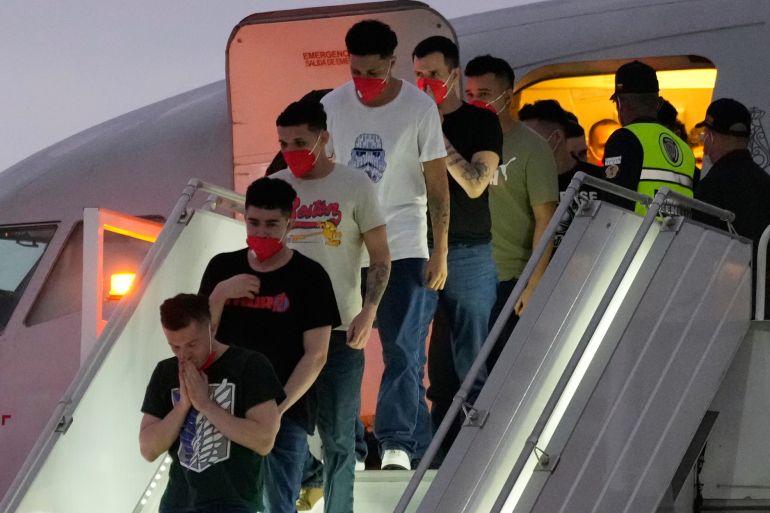US appeals court blocks Trump use of Alien Enemies Act in deportation drive
The Fifth Circuit Court is the highest court so far to rule against Trump’s use of the law to deport Venezuelan migrants.

Published On 3 Sep 20253 Sep 2025
A federal appeals court has ruled that the administration of United States President Donald Trump illegally invoked a wartime law to deport Venezuelans as part of its immigration crackdown.
Late on Tuesday, a majority on the Fifth Circuit Court of Appeals rejected Trump’s use of the Alien Enemies Act of 1798 to expedite deportations without due process.
Recommended Stories
list of 3 items
The Take: Who is behind Tren de Aragua?
end of list
The decision was remarkable on several fronts. It was the first time a federal appellate court had weighed Trump’s use of the 18th-century law, but it was also a strong rebuke to Trump’s mass deportation campaign from a court with a reputation for leaning conservative.
Writing for the majority on the three-person bench, Judge Leslie Southwick rejected Trump’s claim that the Venezuelan gang Tren de Aragua represented an invasion into the US.
“We conclude that the findings do not support that an invasion or a predatory incursion has occurred,” Southwick wrote.
“We therefore conclude that petitioners are likely to prove that the AEA [Alien Enemies Act] was improperly invoked.”
The Alien Enemies Act has the power to give the government wide-ranging powers to detain and deport citizens of “hostile” foreign nations, but only in times of war or during an “invasion or predatory incursion”.
Before Trump, the law had only been used three times — and exclusively during war. But Trump officials have used the law to justify the rapid deportation of Venezuelan migrants, on the basis that they constitute a criminal “invasion” across the border.
Southwick, who was appointed by Republican President George W Bush, rejected that argument.
Advertisement
“There is no finding that this mass immigration was an armed, organized force or forces,” Southwick wrote.
The panel is the highest federal court to so far rule on Trump’s attempts to use the law for deportations. The case is expected to eventually make its way to the US Supreme Court.
Tuesday’s ruling, however, was limited in scope: It only applies to states under the appeals court’s jurisdiction — Texas, Louisiana and Mississippi — though it could be cited as a precedent in other appeals court circuits.
Trump first invoked the Alien Enemies Act on March 15, publishing an executive order that accused the Tren de Aragua gang of “perpetrating, attempting, and threatening an invasion or predatory incursion” into the US.
That same day, his administration flew two planeloads of Venezuelan migrants to El Salvador’s Terrorism Confinement Centre (CECOT), a maximum-security prison notorious for human rights abuses.
That came despite a lower judge’s order blocking his use of the law while the flights were under way.
Trump officials accused the Venezuelan migrants on those flights of being Tren de Aragua members, though their lawyers point out that many of them had no criminal records.
To meet the standards for using the Alien Enemies Act, the Trump administration has repeatedly claimed that Tren de Aragua is controlled by Venezuelan President Nicolas Maduro, a longtime rival of the Republican leader.
Trump has accused Maduro of masterminding a “narco-terrorism enterprise” in a coordinated effort to destabilise the US. But a declassified US intelligence memo has contradicted this claim, saying there is no evidence that Maduro coordinated with Tren de Aragua.
On Tuesday, the US announced it had attacked a boat carrying 11 alleged Tren de Aragua members in international waters in the Caribbean, killing all on board. Trump claimed they were “narcoterrorists”.
Cases related to Trump’s use of the Alien Enemies Act have twice reached the US Supreme Court, which has not yet addressed the underlying validity of the Trump administration’s actions.
In April, the Supreme Court ruled that deportations under the act could proceed, but that immigrants should have “reasonable time” to contest their removals.
It also decided that such challenges should be brought in the federal districts where the deportees are being held, as opposed to courts elsewhere in the country.
In a second ruling, also in April, the Supreme Court blocked the deportations of a group of Venezuelan men in northern Texas.
Advertisement
Then, in May, the Supreme Court extended the block, faulting the Trump administration for attempting to swiftly remove detainees just one day after providing them with deportation notices.
“Notice roughly 24 hours before removal, devoid of information about how to exercise due process rights to contest that removal, surely does not pass muster,” the majority opinion said.
The case was ultimately sent back to the Fifth Circuit Court of Appeals.
In a statement after Tuesday’s decision, Lee Gelernt, a lawyer for the American Civil Liberties Union (ACLU), called the ruling a “critically important decision reining in the administration’s view that it can simply declare an emergency without any oversight by the courts”.
The ACLU represented the Venezuelan men in the case.
But there was one judge who dissented from Tuesday’s decision on the Fifth Circuit Court: Andrew Oldham, a Trump appointee.
Oldham argued that deportations under the Alien Enemies Act were “matters of political judgment” and that the president has the right to determine whether the appropriate conditions were met.
“From the dawn of our nation until President Trump took office a second time, courts have never second-guessed the President’s invocation of that Act,” Oldham wrote.
